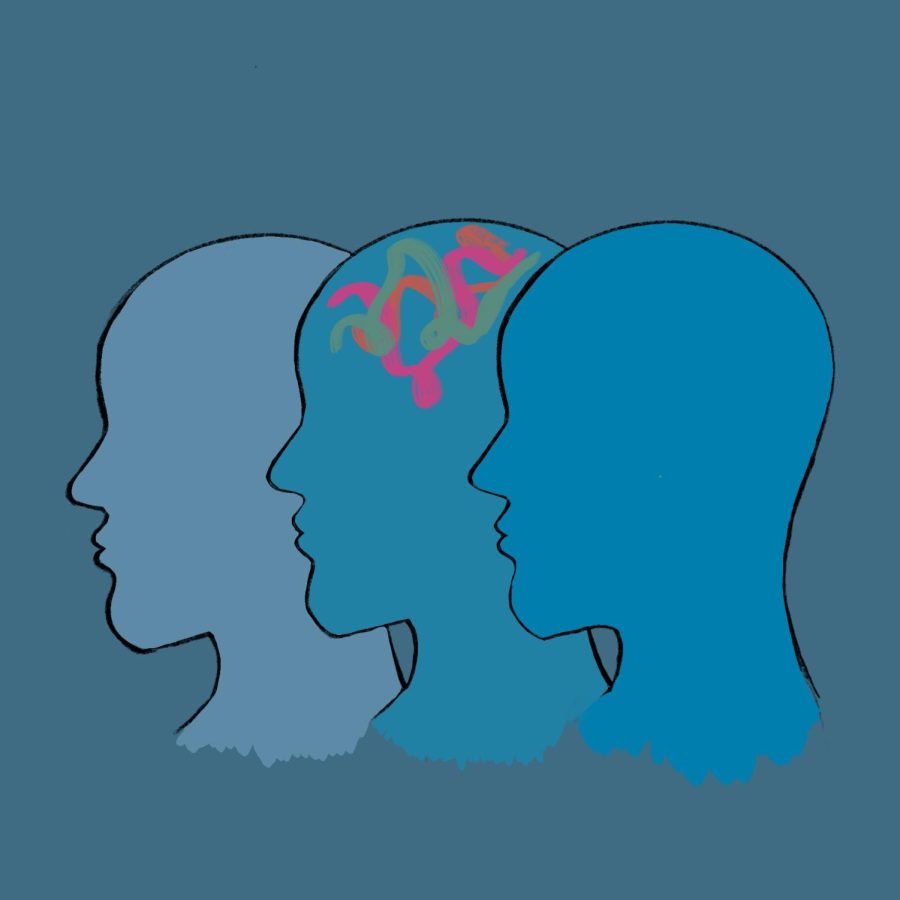Cushman: Acknowledging Mental Health Imposter Syndrome
(Design by Brenda Payan Medina | The Daily Utah Chronicle)
June 29, 2022
Before the start of the pandemic, nearly 20% of adults had a mental illness. As the pandemic raged on, mental health issues rose, including a 25% increase in depression and anxiety.
Despite the massive rise in mental health problems, many people don’t seek treatment for their conditions. Sometimes the cost is too high, but others suffer with what has now been dubbed “mental health imposter syndrome.” Mental health imposter syndrome results in feeling as if one’s mental health struggles aren’t real or bad enough to deserve help.
Opening up about mental health struggles online reduced the stigma around mental health, especially during the pandemic. Though it can sometimes feel difficult to recognize our own anxieties as valid mental health concerns deserving treatment.
Kathleen Walsh explained in an article how she doubted a diagnosis for what she’d long suspected was ADHD and anxiety. She felt that her concerns weren’t valid and believed the doctor had given her a diagnosis to placate her concerns.
Salwa Meghjee talked about how not feeling sick enough stopped her from getting treatment for a long time. Her experiences caused her guilt when writing about mental health, knowing other people experienced “far more severe” illnesses.
And in an article talking about his personal experience with mental health problems, Shawn Henfling detailed how he battled his own feelings of doubt for years before seeking treatment.
When I have worse symptoms of anxiety, I know I should seek resources. During periods when I feel better, I doubt those feelings and wonder if my anxiety is bad enough to ask for help or if I’m experiencing stress. Mental health issues can feel like a competition, where losing means invalidating your own experience.
Walsh’s article explained how the r/Anxiety subreddit board is littered with users asking if their anxiety symptoms need treatment. This is dangerous because untreated mental health concerns often result in severe health consequences, including worsening symptoms, harder recovery and physical health problems. Untreated mental health concerns affect over 27 million U.S. adults, more than half of all adults struggling with mental illness.
Mental health imposter syndrome contributes to the crisis of undertreatment.
Feelings of doubt are reinforced by the stigma surrounding mental health concerns. In Walsh’s article, she discusses how dialogue belittling mental health or talking about “pretenders” made her feel as if her diagnosis was gatekept. If she didn’t struggle enough or if her diagnosis wasn’t “sufficiently devastating,” her experience wasn’t valid.
The guilt and doubt caused by stigma can get worse with limited mental health resources. Knowing so many people are struggling can make it feel difficult or selfish to seek care. For U students especially, limited care can be a major obstacle. The U’s counseling center imposes a 12-session limit for students, despite major increases nationwide in college students seeking care.
When I was in crisis and didn’t have any other options, the counseling center helped me only after I waited weeks for an intake appointment and further weeks to receive treatment. Still, as I waited for resources, I felt guilty about needing help. But the potential of things getting better with treatment kept me going.
In reality there’s no way to measure mental illness. We can rate how we’re feeling, and some days we feel fine, even in the midst of a crisis. Our mental health imposter syndrome can make it hard to feel like we deserve or need care. Young Minds, a youth mental health organization from the U.K., recommends talking to someone about those doubts or writing feelings down. We should strive to look at our mental health as an individual experience rather than comparing ourselves to others.
Critically, we need to recognize that there’s no benchmark for how bad you need to feel to seek treatment. Preventative and early mental health treatment can help us learn to cope with our symptoms before a crisis. We need to encourage early treatment so people can gain the tools to better their mental health and improve their environments.
Your experience and mental illness matter. Your pain matters. It matters regardless of how others experience mental illness. You deserve help if you need it. Our culture needs to recognize mental health imposter syndrome so we can encourage those around us to get the resources they need.










martine • Jul 7, 2022 at 12:54 pm
Ellen, wake up. It’s almost all a scam to trick people into taking psych meds so people can make money. No different than oxycontin and the Sackler family. Also, a diagnosis allows bad parents to skirt responsibility for their bad parenting claiming their kids are mentally ill–when in reality the parents are pure demonic scum who created a monster.
- • Jul 11, 2022 at 1:52 pm
Martine, I strongly disagree. There are plenty of methods to treat mental health disorders without the use of psychoactive meds. I think you are referring to a very small portion of the population.